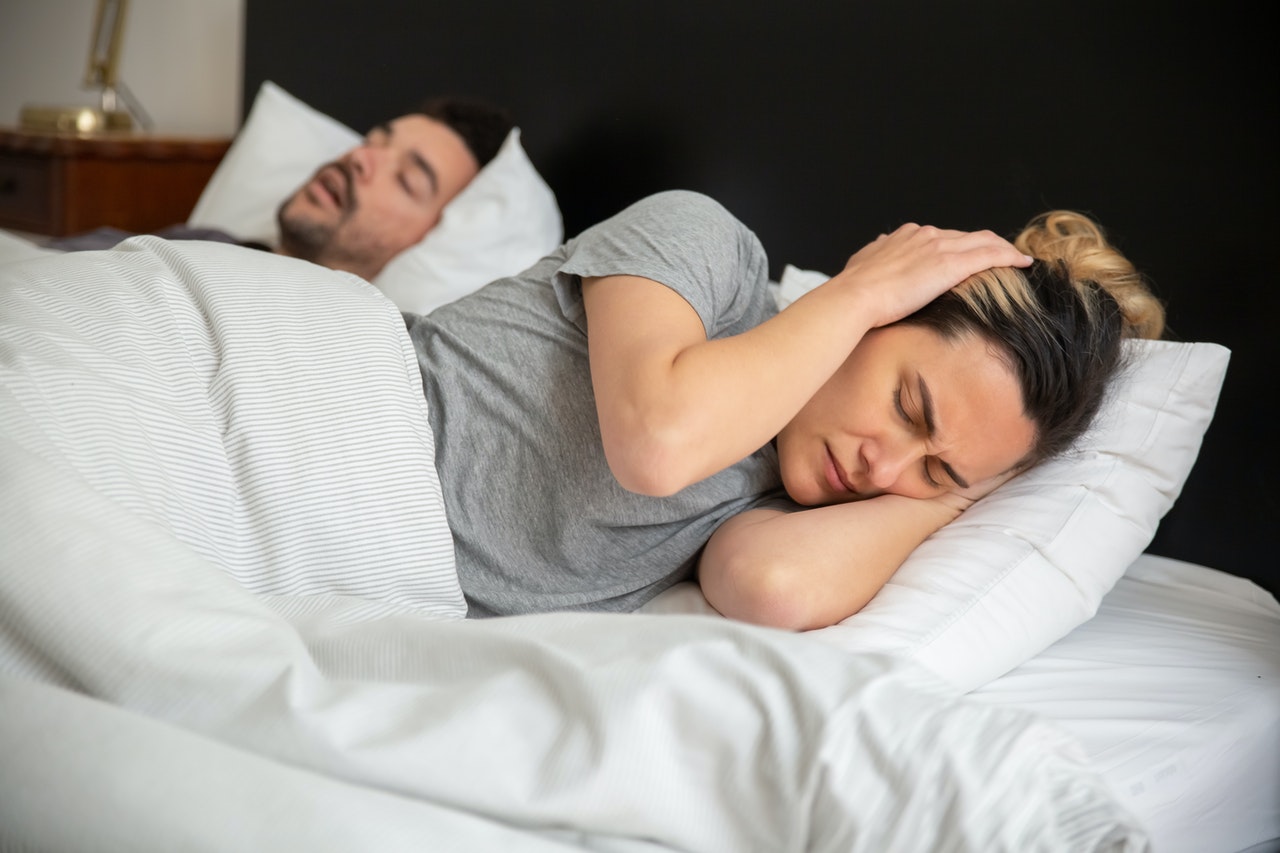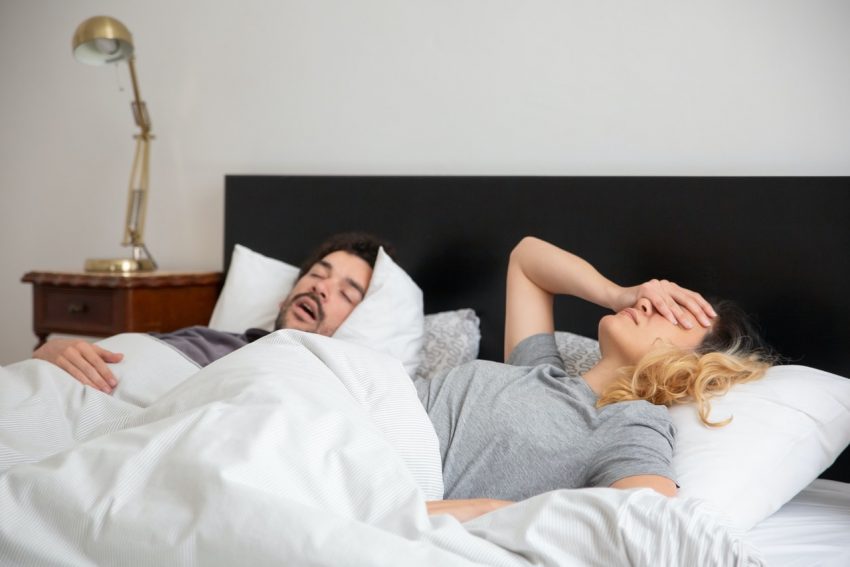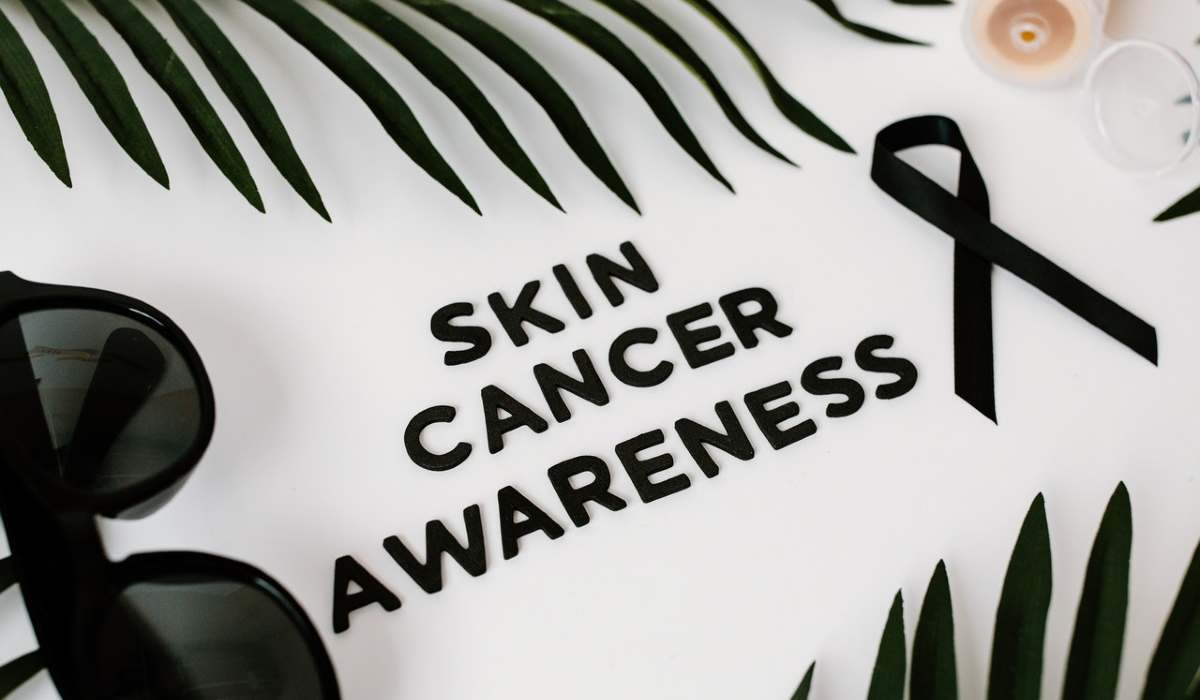Changes in our skin as we age are inevitable, including loss of moisture, changes in…

Snoring: The Lowdown
It doesn’t matter if it’s you or your other half that snores. The chances are, if there’s a snorer in the relationship, then it’s putting a strain on things. But what if there was an effective snoring treatment so simple you could have it done in your lunch break?
Well, there is, and we’ll get to that (or you could skip to our ‘Final Solution’ at the end of this post if you really can’t wait). But let’s explore the issue and options a bit first.
Snoring might not be a problem if you’re the culprit and you live alone. The problems tend to arise when you’re sharing a bed. It can wreak havoc on your partner’s sleep cycle, affect their health and, of course, your relationship with them.
There are hundreds of myths about the cause of snoring, and old wives’ tales about cures. Some ring true, and others are complete codswallop. But as always, we’re here to sift the wheat from the chaff and give you the facts.
6 (Practically) Free Snoring Remedies
Start With An App
Sleep tracking apps have been popular for a while now, and no less popular are their partners, the snore-trackers. If you’re worried about snoring, getting as much information as possible about your habits is a great place to start. An app can help with that.
Snore-tracking apps will record your sleep and snoring habits throughout the night. They will analyse exactly how much you snore, and during which part of your sleep cycle.
These apps are a great way to see how changes you’ve made are taking effect, such as if you’re using a nose clip or similar. Not all snoring apps are free, mind you, but many are. So, for a quick, easy, and likely free way to change things up, apps are a great starting point.
Mix Up Your Sleeping Position
Another simple trick for snoring can be as simple as changing the position you sleep in. Many of us prefer sleeping on our side or back; this can make our tendencies to snore worse as the muscles of our body (including our throat and airways) relax.
If you or your partner notice that you tend to snore more on your back (as is commonly the case), this could be because the tongue and throat tissues shift backwards. This, in turn, narrows the airway and increases the vibrations as we breathe.
Mix it up and try sleeping on your side, and see how it goes.
Lose a Little Weight
Most of us are aware that snoring is more common when you’re overweight. This comes down to the simple fact that when we’re heavier, our airways are narrowed (just like when we sleep on our backs).
We’re not saying go on a crazy diet to cure your snoring. And we’re not saying opt for a weight-loss procedure, either – though if you’re considering this route, we strongly recommend Coolsculpting or EMsculpt.
What we are saying is that even losing a few pounds can make more difference than you might realise.
Statistically, if you have a high BMI (Body Mass Index), you’re also more susceptible to developing sleep apnoea. This is because when we carry extra pounds around our middle and chest, the fat there pushes against our ribs and diaphragm as we sleep (thanks, gravity), which essentially reduces our lung capacity.
It’s actually one of the most significant factors in developing sleep apnoea, so losing a couple of pounds can’t hurt.
Keep Your Bedroom Clean
How can tidying your room help with your snoring, you might think?
Well, there are plenty of experts who believe snoring can be caused by what essentially amounts to a blocked nose. Effectively, we’re talking about a low-level allergic reaction. And when you take a moment to think about it… it makes sense.
Of course, our breathing is affected by the quality of the air around us. So yes, dust mites in the air, pet hair around the bedroom and even hay fever can all make snoring worse. After all, even people who don’t snore will snore occasionally, when they have a cold or are bunged up.
Our pillows can be a source of accumulated dust mites, dead skin, and lots of other lovely things we’d rather not think about. Which is why it’s worth considering investing in bed linen that’s anti-allergy, or at least anti-allergy pillowcases.
Opening a window can also help, as we sleep better in cooler environments where we can breathe fresh air. If you remember your basic science from school, you’ll remember that cold temperatures cause contractions, which in terms of snoring means our airways can dilate more easily, and the vibrations that cause snoring are reduced.
Work The Muscles of Your Mouth
Believe it or not, there are exercises for almost every part of the body you can think of. Your mouth is no different. Daily attention to mouth exercises can do more than you might think to reduce snoring, even if you feel a bit silly doing them.
- Starting simple, you can hum.
No, not quite the usual jaunty tunes you’re used to. By gripping the tip of your tongue between your teeth (gently!) and making a humming sound that goes from low to high (think singing scales), you can strengthen the muscles in your throat.
- Stick your tongue out as far as possible, then try to touch your nose with your tongue.
Yes, this top exercise looks much like a childish game you might have played as a kid. Don’t dismiss it though! In fact, expand on it:
- try to touch your tongue to your chin
- try to touch your tongue as far across your right cheek as you can
- do the same with your left cheek
Yes, you’ll might feel silly performing these mouth exercises, but they can make a real difference! And no one ever has to know (it can be our little secret).
Try both exercises every day, ten times each.
Skip The Drink
Many of us indulge in a glass of wine or similar after a long day at work, and often it can help us relax and fall asleep more easily. Unfortunately, it’s also exacerbating your snoring (and that booze is doing no favours for your skin condition, either).
Alcohol has a sedative effect on the body that not only relaxes your limbs, but relaxes your jaw and throat, too. As this happens, your airway can become constricted and your airflow is reduced. And, as you’ve probably worked out, that is a sure-fire way to start snoring.
If that wasn’t enough to deter you, consider this: alcohol can make you sleepy, right?
Well, it’s actually completely disrupting your natural sleep patterns, and reducing the quality of your sleep. As such, there’s a higher chance you’ll struggle to stay awake and find yourself more tired the next day… which is linked to a whopping 22% increase in food intake. And, as you may remember, being overweight is another trigger for sleep apnoea and snoring.
The Snoring Treatment Coup de Grâce (Final Solution)
Laser Those Snores Away
The inconvenient truth is that you might try everything we’ve listed in this post and more… and still find yourself snoring. Sometimes, a bolder solution is called for. Particularly in cases where your snoring is causing you (or your partner) to suffer the likes of:
- Inadequate sleep quality
- Interrupted sleep patterns
- Daily fatigue
- Irritability
- Poor concentration
- Headaches
- Reduced productivity
- Reduced libido
Knowing when to seek help is important, and the best place to start is with a GP. They will know the right questions to ask to discover the cause of your snoring and may refer you to an ENT specialist for more information.
Once you’ve got the cause down, there are treatments to consider.
One such treatment is the innovative Somnilase laser treatment, specifically developed for snorers to help strengthen the internal structure of your soft palate and uvula (the dangly bit in the back of your throat). This additional stability reduces the noisy vibrations we make as we breathe.
And, the procedure is entirely non-surgical – you really can walk-in walk-out with this remarkably effective treatment.
At the Cambridge Laser Clinic, we’ve been performing this snoring treatment for about as long as anyone. Get in touch with us today if you’re ready to discuss your options and book your free consultation.






